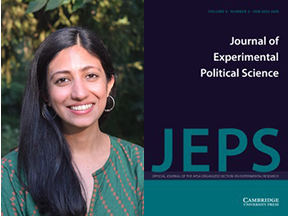
Sarah Khan has an article in the Journal of Experimental Political Science with Gradate Student Annabelle Hutchinson and former Graduate Student Hilary Matfess entitled “Childcare, Work, and Household Labor During a Pandemic: Evidence on Parents’ Preferences in the United States.”
Abstract:
By exacerbating a pre-existing crisis of childcare in the United States, the COVID-19 pandemic forced many parents to renegotiate household arrangements. What shapes parents’ preferences over different arrangements? In an online conjoint experiment, we assess how childcare availability, work status and earnings, and the intra-household division of labor shape heterosexual American parents’ preferences over different situations. We find that while mothers and fathers equally value outside options for childcare, the lack of such options – a significant feature of the pandemic – does not significantly change their evaluations of other features of household arrangements. Parents’ preferences over employment, earnings, and how to divide up household labor exhibit gendered patterns, which persist regardless of childcare availability. By illustrating the micro-foundations of household decision-making under constraints, our findings help to make sense of women’s retrenchment from the labor market during the pandemic: a pattern which may have long-term economic and political consequences.